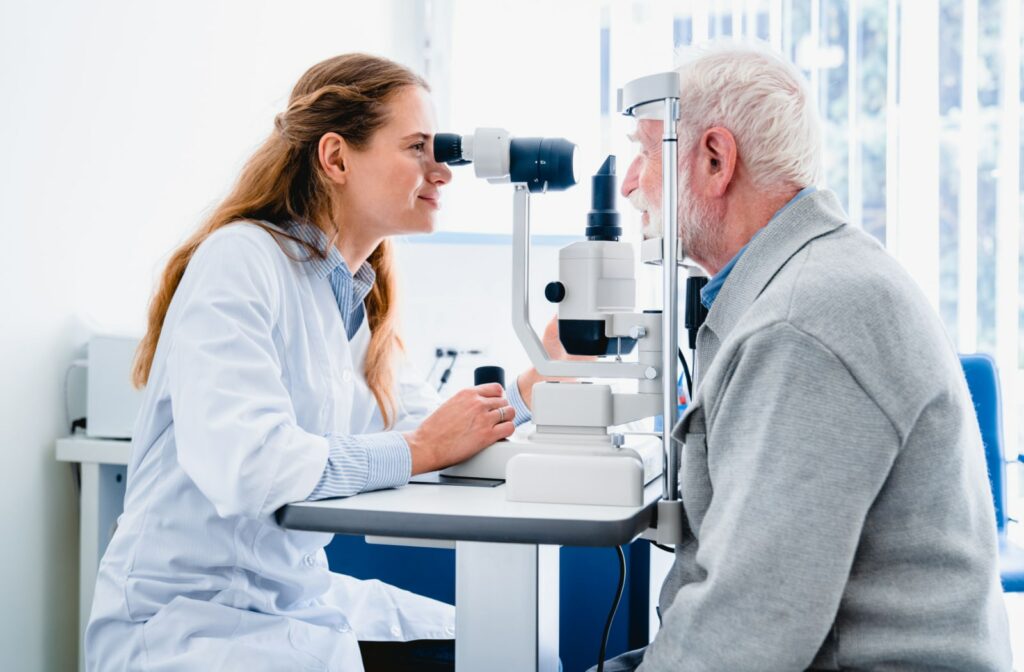Eye exams are not only for vision correction and updating your prescription for glasses or contact lenses. A comprehensive eye exam can also help detect eye-related diseases and various health problems such as:
- Age-related macular degeneration
- Diabetic retinopathy
- Glaucoma
- Cataracts
- Diabetes
- High blood pressure
- Cancer
- Autoimmune disorders
The Importance of Eye Exams
Regular children and adult eye exams help monitor and correct vision problems such as refractive errors. But eye exams also play a pivotal role in safeguarding your ocular health and overall well-being.
Many eye diseases and conditions present with little to no symptoms. Comprehensive eye examinations conducted by your eye doctor can detect the early signs of various eye diseases and systemic conditions, including diabetes, hypertension, and cancer, often before symptoms manifest elsewhere in the body.
Additionally, eye exams are crucial for identifying potential vision-threatening conditions like glaucoma and cataracts, allowing for timely intervention and preserving eyesight.
Eye Diseases
Modern equipment and eye exam tests help identify early warning signs of eye diseases so you can receive prompt treatment to preserve your vision. Eye diseases that an eye exam can detect include:
- Age-related macular degeneration
- Diabetic retinopathy
- Glaucoma
- Cataracts
Age-Related Macular Degeneration
Age-related macular degeneration (AMD) is a progressive eye disease that predominantly affects central vision. The macula, a small but vital part of the retina (the light-sensitive tissue at the back of the eye) responsible for central vision, deteriorates over time in individuals with AMD.
Degeneration of the macula can lead to blurriness or a blind spot in the central field of vision, affecting activities like reading and recognizing faces. AMD exists in 2 forms: dry and wet AMD.
AMD can develop slowly or fast, making early detection through regular eye exams critical for implementing preventive measures and managing the progression of the disease.
Diabetic Retinopathy
Diabetic retinopathy is an eye disease that affects the blood vessels in the retina. Damage to the blood vessels in the eye due to high blood sugar causes them to leak fluid or bleed.
The early stages of diabetic retinopathy show no symptoms. However, your optometrist can check and monitor the disease with regular diabetic eye exams. Early treatment can help stop the damage and preserve vision.
Glaucoma
Glaucoma, often dubbed the “silent thief of sight,” can gradually erode vision without noticeable symptoms. Regular eye exams are crucial in detecting glaucoma early with signs such as elevated eye (intraocular) pressure and optic nerve damage. Early detection of glaucoma can prevent damage to your vision.
Cataracts
Cataracts are usually an age-related eye condition that causes clouding of the eye’s lens. Because most cataracts develop slowly, individuals may not notice changes in their vision. Tests such as visual acuity, retinal exams, and slit-lamp exams conducted during an eye exam can determine if you have cataracts.
Systemic Diseases
Eye exams can help detect systemic health diseases such as diabetes, high blood pressure, and some cancers.
Diabetes
While your healthcare provider can diagnose if you have diabetes with a glucose test, your optometrist can detect the early signs of diabetes by seeing changes to the blood vessels in your eyes. Diabetic eye exams can help monitor your condition.
High Blood Pressure
An eye exam can detect early signs of high blood pressure or hypertension before they cause significant damage to your health. Regular visits to your eye doctor can help identify this disease because high blood pressure can cause the blood vessels in your eyes to narrow, bleed, or leak.
Cancer
An eye exam can also detect different types of cancers, including skin cancer, brain cancer, tumors that can cause optic nerve swelling, and leukemia from bleeding in the retina. Your optometrist can detect these cancers by checking the appearance of the blood vessels and the unusual shapes or colors of the retina.
Autoimmune Disorders
Autoimmune disorders, characterized by the immune system attacking the body’s tissues, can leave their mark on ocular health. Conditions like rheumatoid arthritis and lupus may present with eye-related symptoms, such as dry eyes or inflammation. With an eye exam, your eye doctor can detect these signs and collaborate with healthcare professionals to manage these diseases comprehensively.
How Often Should You Have an Eye Exam?
Your eyes are constantly changing. To monitor these changes, visit your optometrist for an eye exam based on the following age groups:
- Ages 18–64: Every year or more frequently if recommended
- Age 65 and over: Annually or more frequently if recommended
Protect Your Vision & Health with Regular Eye Exams
Routine eye exams are a proactive step towards maintaining eye health and clear vision. They can detect many diseases that you might not yet be aware of, including diabetes, high blood pressure, cancer, and glaucoma.
Early intervention is essential for prompt management and treatment and, in many cases, can protect your vision from worsening. If it’s been more than a year since your last eye exam, and even if you don’t notice any changes to your vision, book an eye exam with Dr. Bittel Optometry today.


